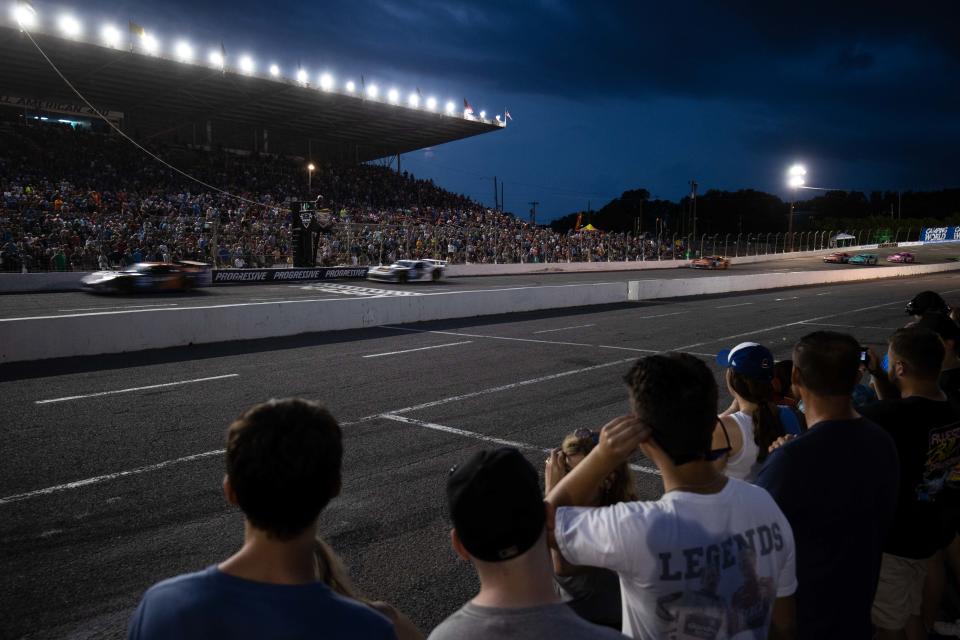Nashville speedway deal survives critical council vote, but third of body supported halt
Nashville's Metro Council on Tuesday narrowly rejected a measure that would have sent a proposed deal to renovate and expand the Nashville Fairgrounds Speedway back to the drawing board.
The council voted 13-15 with two abstentions against a budgetary change to one of the deal's primary funding sources: Metro-backed revenue bonds that rely on future revenue from the completed venue to pay off construction debt.
While Tuesday's vote doesn't concretely indicate how council members may vote when they consider the deal itself in July, it does show that 13 of the city's 39 sitting council members — a third of the governing body — supported hitting the brakes.
The deal would enter the city into a 30-year agreement with Bristol Motor Speedway, which would oversee roughly $100 million in renovations to the historic track, including construction of a 30,000-seat grandstand, a sound wall and an "enhanced infield." The renovation would be funded by $17 million from the state, $17 million from the Nashville Convention and Visitors Corp. and revenue bonds issued by the Metro Sports Authority to cover the remainder.
Proposed change intended to send a message
Metro Council member Colby Sledge, who says most of his constituents in the neighborhoods surrounding the fairgrounds oppose the deal, offered an amendment to the city's capital improvements budget, or "wish list" of one-time expenses.
Instead of allowing up to $100 million in revenue bonds for the deal as it's currently proposed, Sledge's amendment would have substituted $50 million in general obligation bonds, which are paid using property tax dollars.

An item's inclusion in the list does not mean it will be funded, but an item must be in the capital improvements budget to receive capital funding. If Sledge's amendment had passed, it would have taken the proposed $100 million in revenue bonds for "fairgrounds improvements" out of the equation. The deal could have been scrapped, renegotiated based on the $50 million in general obligation bond funding, or the next mayor's administration could have sought to amend the capital improvements budget.
Sledge said he offered the change to send a message that more time is needed to discuss the deal than the two months remaining in the council term, and push back against the state legislature's passage of a law designed to make the speedway deal easier to pass through Nashville's council.
Those who opposed the amendment stressed that including $100 million in revenue bonds in the capital improvements budget does not mean those bonds will be issued, but it would leave that funding option on the table.
"To say we want to 'keep options open' when the community says, 'we don't want this option' means that we're not listening to the community," Sledge said Tuesday, warning that rejecting the change would mean two months of council members "being pressured to say, 'you need to do it, you can't change it or it will kill the deal, and we've had all the meetings that we need to have.'"
The Metro Nashville Fair Board narrowly approved the deal 3-2 in March. Several council members said they did not believe the council's remaining five meetings will be sufficient to thoroughly vet the deal before voting on its final approval.
At-large Council member Bob Mendes criticized the proposal's structure. He called the revenue streams expected to repay construction costs "dubious from the get-go," especially considering a general decline in auto racing viewership.
Deal faces multiple remaining hurdles
The deal faces a complicated road ahead.
Pending lawsuits challenge how many votes are needed for the deal to pass. Metro's charter was amended via voter referendum in 2011 to require a 27-vote supermajority to approve any demolition to the Nashville Fairgrounds premises, but a new state law reduces the threshold to 21 votes. Metro attorneys say the state law violates the Tennessee Constitution because it changes Nashville's charter without approval from Metro Council or a referendum for Davidson County voters.
The council is in its annual budget process, pushing any consideration of deals requiring the issue of bonds, including the fairgrounds speedway proposal, to July.
On top of that, the terms of current council members, Vice Mayor Jim Shulman and Mayor John Cooper are also nearing their end. Voters will select their new representatives on Aug. 3.
Under current Metro law, Sledge must call a public meeting on the deal proposal before the council can consider its passage. Sledge scheduled the public meeting for July 25, leaving a slim margin for council consideration of the deal before the term ends. Council member Zach Young, a vocal supporter of the deal, has proposed a bill that would change Metro law to abbreviate the public meeting step.
Related: Poll finds support for speedway renovation, but most Nashvillians unaware of proposed deal
Vote breakdown
∎ In favor of Sledge's amendmentBob Mendes, Sean Parker, Emily Benedict, Erin Evans, Russ Bradford, Ginny Welsch, Colby Sledge, Tom Cash, Freddie O'Connell, Brandon Taylor, Delishia Porterfield, Sandra Sepulveda and Angie Henderson.
Opposed to Sledge's amendment∎ Sharon Hurt, Burkley Allen, Kyonzte Toombs, Brett Withers, Tonya Hancock, Zach Young, Larry Hagar, Kevin Rhoten, Gloria Hausser, Tom Druffel, Kathleen Murphy, Russ Pulley, Courtney Johnston, John Rutherford and Dave Rosenberg.
Abstaining∎ Joy Styles and Antoinette Lee.
This article originally appeared on Nashville Tennessean: Nashville speedway deal narrowly survives critical council vote

